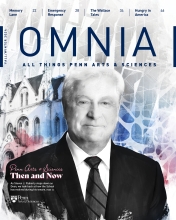A Loss for the Omnia Family
In September, we suffered the shocking loss of a friend and colleague who had played a vital and invaluable role in shaping the identity of this magazine.

This is a hard Editor’s Note to write. It comes just a few short weeks after the Omnia team suffered the shocking loss of our friend and colleague, Susan Ahlborn, who passed away unexpectedly in September. Sue, who was associate editor of this magazine, was a gifted writer who penned countless features and stories during her more than 12 years with Penn Arts & Sciences. We are so grateful that her words still get to appear in this issue, in the tremendous feature she wrote about David Wallace, Judith Rodin Professor of English (“The Wallace Tales”), as well as in her coverage of a new book by historian Sarah Gronningsater (“Children of Freedom”) and a film by Ejun Hong, C’25, about Russia’s war on Ukraine (“Using Animation to Spread Strength and Hope”).
Sue had an unassuming nature and a dry wit that put everyone at ease. She loved her job and loved talking to people—something that came through in the stories they’d share with her, which she retold eloquently in the pages of Omnia. She took great pride in weaving an impactful narrative for our audience. She profiled faculty rockstars like Emily Wilson (“Emily Wilson’s Epic Life,” Spring/Summer 2024) and dove headfirst into challenging topics like physics (“The Physics of Us,” Fall/Winter 2022) or disability research (“Seeing Disability Differently,” Spring/Summer 2023). She was a staunch grammarian and an artiste with an E. Not only did she make Omnia a better magazine, but she also made the team an amazing one to be a part of.
We will miss her story ideas and her unique take on many subjects, but even more than that, we’ll miss hearing about her 1995 Mustang and her gray cat, Winkle, who made frequent—if uninvited—appearances on Zoom. We’ll miss Sue’s attentive smile on those Zoom calls, too. No matter how dull the subject, she always looked interested, a calming presence without saying a word. I will personally miss having a brainstorming partner—someone to bounce ideas off of and ask how some aspect of Omnia was previously done. She always answered happily, regardless of whether it was the first or sixth time I’d asked.
Sue’s time with us was unquestionably far too short. There’s also no question about the vital and invaluable role she played in shaping the identity of Omnia—the magazine as a whole, the issue you hold in your hands, and every one she wrote for in the past.



